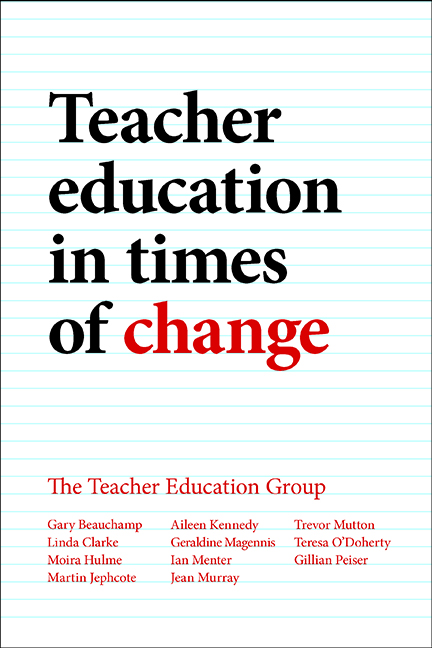Book contents
two - UK and Irish teacher education in a time of change
Published online by Cambridge University Press: 23 August 2022
Summary
Introduction
There is growing international concern about all aspects of teacher education and its links with teacher professionalism, school improvement and pupil outcomes. In association with the increasing marketisation of education via parental choice mechanisms, standardised assessment techniques, national league tables and local management of schools, a significant shift has taken place in the way teachers are perceived and the way they perceive themselves as professionals. Teachers are no longer regarded as members of a self-regulated, autonomous profession, but have become subject to rigorous public scrutiny and accountability regimes. Although the concept of ‘reflective practice’ features prominently in this ‘new’ teacher professionalism, it is difficult to reconcile with government discourses that locate teaching and learning within a paradigm of technical rationality. The relentless pressure on teachers and schools to position themselves favourably in national and international performance league tables, rigorous inspection against externally determined professional standards and performance management have created ‘a culture of compliance’. At the same time as teachers’ space for critically reflective practice has become increasingly restricted, the demand for engaging in crossprofessional and multi-agency work has become a feature of the ‘new’ professionalism and raises questions about the location of teachers’ professional knowledge and learning and the role of the academy within the wider teacher education continuum from initial teacher education, through induction to continuing professional development.
However, universities themselves within the United Kingdom (UK) and Republic of Ireland (RoI) have not shared a coherent understanding of their potential role in teacher development on a mass scale. For example, the challenge for universities of agreeing what a ‘masters’ profession would consist of (Jackson and Eady, 2012) is indicative of the need for further conceptualisation of what constitutes a valid knowledge base for professional development. Debate around the short-lived Masters in Teaching and Learning in England (2010–13) indicated the need for universities to re-evaluate their own gatekeeping mechanisms and regulation of teacher participation in the academy. None of this has been resolved in the disengagement of current policy in England from these issues. In Wales, the first steps towards national-scale Masters-level professional learning for early career teachers have been closely tied to technology-supported selfdirected study and the importance of working with external mentors on the Masters in Educational Practice.
- Type
- Chapter
- Information
- Teacher Education in Times of ChangeResponding to challenges across the UK and Ireland, pp. 19 - 36Publisher: Bristol University PressPrint publication year: 2015

